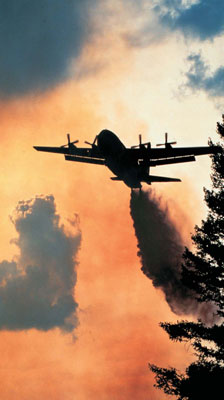
FIRE SUPPRESSION:
Foundational Doctrine
June, 2005
Leadership & Accountability
Fire Leadership
People are our most important asset in the fire suppression organization.
In true professional manner they execute operations in a complex, dynamic
and at times unpredictable environment. They deserve our very best leaders
of character and competence with the
initiative to achieve excellence while maintaining accountability
in the face of a sometimes daunting task.
Leaders in the organization must be capable of independent and intelligent
action willing and eager to accept  the
new roles and responsibilities required of them. The hallmarks of Forest
Service leadership are action, attitude, and accountability. the
new roles and responsibilities required of them. The hallmarks of Forest
Service leadership are action, attitude, and accountability.
Leadership defined means providing purpose, direction and motivation
for wildland firefighters working to accomplish difficult tasks under
dangerous and sometimes stressful conditions. This concept as well as
improving the organization applies to all individuals, not just those
in leadership positions.
Leadership is a heritage passed from Forest Service leader to leader
since the founding of the agency, mainly acquired by observation, experience
and emulation. Working with other leaders is the most effective Forest
Service leader’s school. Our agency culture embraces mentoring and
continuous learning as essential to development of future leadership where
every leader is a firefighter, and every firefighter is a leader.
Character
Leadership Values and Principles - Effective leaders
demonstrate a commitment to duty, respect
for others, and personal integrity.
Their commitment to duty is reflected in:
—Proficiency of skills in their job – both technical and
leadership.
—Sound and timely decisions.
—Their ensuring tasks are understood, supervised and accomplished.
—Development of subordinates for the future.
Leaders demonstrate respect by:
—Knowing and looking out for the well being of their subordinates.
q Keeping their subordinates informed. q Nurturing the capacity of their
team. q Employing subordinates in accordance with their capabilities.
Leaders demonstrate integrity by:
—Knowing their strengths and weaknesses and seeking improvement.
—Seeking and accepting responsibility for their actions.
—Setting an example worthy of emulation.
Leadership Attributes
Physical, mental, and emotional
attributes contribute to leadership fitness. Effective leaders:
—Take actions to promote good health and physical fitness that
enhances their ability to better think, decide and act under stress.
—Demonstrate inner drive to improve and succeed; have the capacity
to think and apply what they learn in accomplishing the leader’s
intent; maintain situational awareness; and exercise good judgment under
stress.
—Remain level headed and exert self control in tough situations;
maintain a balance of attitude to place proper perspective in different
situations; have the humility to seek assistance; and have the confidence
to act appropriately under stress.
Competence and Accountability
Effective leadership occurs when there is a partnership among agency
administrators, fire supervisors, and fire fighters in which roles and
responsibilities are commonly understood, honored, and redeemed.
Demonstrated fitness of command is a requirement for leadership positions
associated with fire fighting. In this context, we do not accept mediocrity
in leadership at any level. We do not measure fitness simply by the training
courses and tasks completed. Those selected for leadership positions will
have demonstrated they:
—possess and exercise interpersonal, conceptual, and technical
skills;
—knowledge;
—experience;
—physical, mental, and emotional capacity.
Leaders will have also demonstrated high self-awareness – an ability
to recognize when a situation may exceed their capabilities and a willingness
to request appropriate help. This demonstrated fitness provides for greater
operational flexibility and discretion.
Leaders clearly communicate intent. Effective leaders prepare clear,
concise, uncomplicated plans and concise instructions to ensure thorough
understanding of:
—Task
—Purpose
—End State
—Acceptable actions and restrictions (consistent with the leader’s
intent)
Leaders empower their subordinates. They will only order details regarding
execution if measures which serve the same objective have to be harmonized,
if political or “fire fighting” constraints require it. They
give the latitude to subordinate leaders in the execution of their mission.
Leaders regularly monitor performance for effectiveness and have a duty
to take action when there is recognition of performance problems
or exceptional performance.
Accountability, both positive reinforcement and negative, at all levels
of the organization will be based on individual behavior
as measured by:
—Adherence to the rules.
—Appropriate application of doctrine, principles and guidelines.
—Execution of responsibilities commensurate with role.
—Appropriate use of available information.
Administrative actions are based on agreed to and known distinctions
between acceptable and unacceptable behavior – on agreed to and
known distinctions between errors and willful violations.
<<< continue
reading—Cost Management >>>
|
